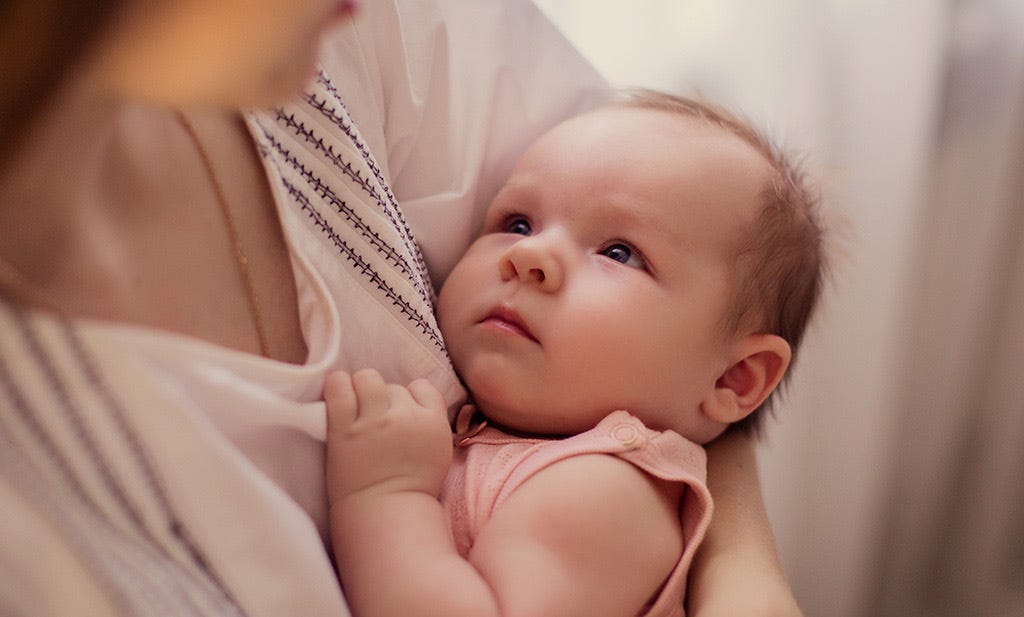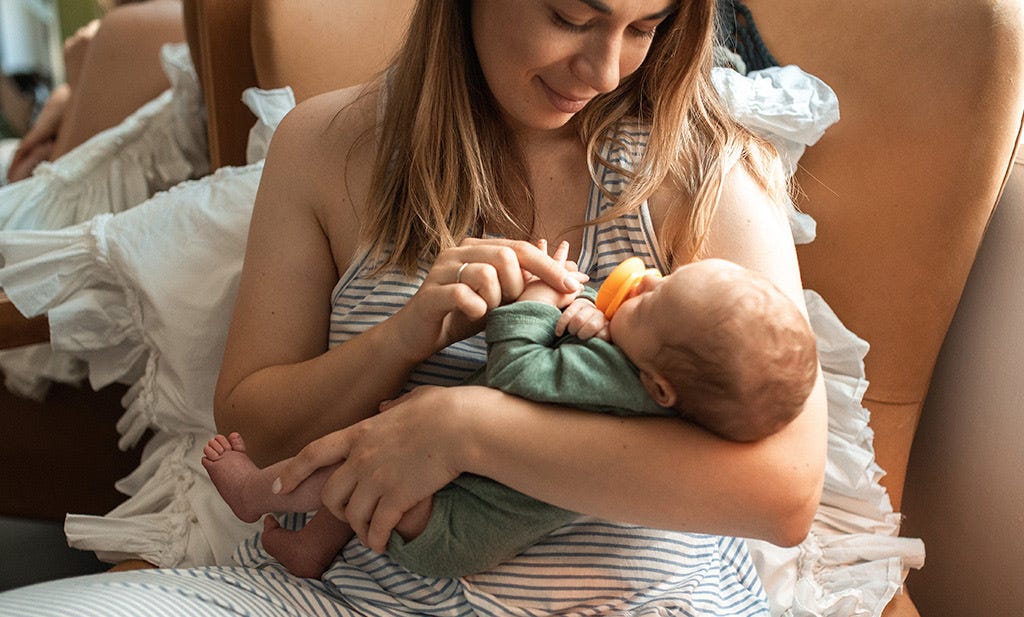
We've all been there: you've been pacing up and down the room for what feels like hours, your little one is lying in your arms or sitting in the carrier and is finding it difficult to fall asleep. But they really need it! And you had already planned to tackle some of your to do list or get some rest yourself (aka some doom scrolling on the sofa)! No matter what you try whether you sway, sing, bounce on your birthing ball - if it just doesn't work and you get more and more overwhelmed... this is where the basic problem lies as our midwife and sleep expert Katrin Ritter knows. Because one of the magic words in baby sleep is relaxation and your child can’t be relaxed if more and more external stimuli are acting on them.
The story of the sabre-toothed tiger: why baby won't sleep unless held!
To find out why, let's take a quick look at the science of baby sleep. A baby needs to be warm, full, and tired to fall asleep. But not only that. They also need to be relaxed, and to feel safe and secure. And this is where evolution comes into play. Because babies’ instincts are the same now as they were thousands of years ago. Their instincts tell them that without direct physical contact with their carer, they have no protection against sabre-toothed tigers (or other potential dangers!) in the night. So if your baby won't sleep unless held then don’t worry, they’re absolutely normal! The cognitive ability to realise that you are still there, even if they can't see you, is something your baby only develops at around 9-10 months. That's why lying alone in bed feels so awful to them. That doesn't sound relaxing at all, does it? On the contrary, this perceived danger triggers an adrenaline rush, and this is exactly what prevents your baby from falling asleep.
It is therefore extremely important to give your baby a feeling of security. For many, this means lots of physical contact, depending on your little one's age. Securely attached babies who can rely on a close, reliable bond with their parents during the day, need less and less help to fall asleep as they get older due to their ever-improving self-regulation. In other words, exactly the opposite of what our mothers and mothers-in-law learnt back in ‘their day’. The older babies get, the more important it is to have sufficient sleep pressure and an inner willingness to sleep - and this is closely linked to the magic word mentioned above: relaxation. From the fourth to sixth month, some babies can start to learn to fall asleep independently in very small stages as parental support is gradually reduced.
How to get a baby to sleep?
So what can you do to make your baby feel safe enough to fully relax? Here are our top tips on how to get a baby to sleep:
- In the first year of life (and as long as it works for you all), a family bed or a crib or bassinet next to your bed for baby is something our expert recommends as a great option for everyone to get the most sleep. This way you are always close by, and the above-mentioned sabre-toothed tigers don't stand a chance
- Create a safe sleeping environment according to recommendations to prevent sudden infant death syndrome, the Lullaby Trust is a great resource for this
- Choose a sleeping bag that matches the room temperature and size of your child, with appropriate clothing underneath (baby should neither cool down nor overheat)
- Keep things quiet, slow and relaxed as you wind down for bed
- A darkened room with no stimuli supports the process of falling asleep
- To minimise excitement, everything should always be the same, including the sleeping environment
- You can't sleep if you’re hungry: feed your baby sufficiently some time before sleep
- Positive associations: the experience of falling asleep should be a positive one. If after a while baby just is just getting upset and not sleeping, abandon things, calm everyone down and start all over again a little while later.
- You can soothe your baby with soft, gentle storytelling, singing or humming or shushing noises, and rhythmic, gentle tapping, gentle strokes etc.
- Give a dummy if you like (after breastfeeding has been established)
Provide gentle movement stimuli- And very important: stick to age-appropriate wake windows

When do babies sleep 7pm to 7am?
If you’re wondering when do babies sleep 7pm to 7am then the short answer is that they might not! Once your baby has fallen asleep, it doesn't mean that they will sleep through the night. Your baby may even wake up every hour or half hour and ask for you. This is because your baby's sleep cycle is divided into light, deep and dream sleep phases. And a cycle usually lasts 45 to 60 minutes. Every time your baby enters the light sleep phase (a baby has more dream phases than an adult), there is a higher probability that they will wake up and you might need to help them get back to sleep. However, if your baby can find their own way to sleep at some point, there is a good chance that they will be able to continue sleeping on their own and at some point, sleep through the night. Yay!
When does baby no longer need help to get to sleep?
After introducing a good sleep routine, you can withdraw more and more if you would like. Please listen to your intuition and be patient with yourself, but especially with your child. Little ones have to master big developmental steps, especially in the first year of life. Please don't compare your child's sleeping behaviour with other children and give yourself the time you need. You can maintain each change for several days/weeks before taking the next step.
But remember the following: Until they are about three years old, your little treasures are still dependent on your co-regulation in one way or another. Until then, they will probably keep waking up in the night and need your help to stay asleep. Some more, some less. This is another reason why a family bed or a large co-sleeper bed is the easiest and most relaxing for everyone involved. Because when you are relaxed, so is your child!
Katrin’s 5-point plan for how to get a baby to sleep!
This 5-point plan outlines Katrin’s most important points for how to get a baby to sleep:
- Ensure relaxation (quiet, slow, calm)
- Establish a bedtime routine
- Reduce your help (co-regulation) as baby gets older and when you feel comfortable doing so
- Introduce an adequate cuddling helper (from 4-6 months)
- Offer adequate sleep help at night to connect your baby's sleep cycles
Good luck and sweet dreams. You can do it!
Source: Babyschlaf, Dr Daniela Dotzauer, Mabuse-Verlag, 1st edition





















